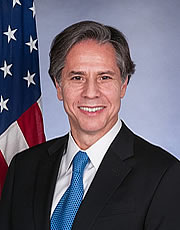An artificial intelligence system called “Northstar” is informing State Department efforts to shape public narratives and policy by monitoring media reports and social platforms, according to senior officials.
“We've seen already as we've been testing things out,” Secretary of State Antony Blinken said, how to use “AI as a tool for helping negotiations with multilateral organizations … using it as a way to combat disinformation, one of the poisons in the international system today.”
Blinken spoke at a June 28 event State hosted to encourage department staff to “just get started” using artificial intelligence.

Secretary of State Antony Blinken
Using artificial intelligence to monitor social media for potential threats has emerged as a controversial application of the technology, with civil society groups warning of inherent biases in AI systems, particularly when it comes to interpreting other languages, such as Arabic, which the groups have shown has resulted in individuals being labeled as terrorists due to their religious affiliation.
In conversation with Matthew Graviss, State’s chief data and artificial intelligence officer, Blinken said, “We have one program that we're using that is able to basically ingest a million articles every day from around the world in [about 200] countries, in over 100 languages, and then immediately translate, synthesize and give you a clearer picture of what's happening in the information space immediately.”
“This is an incredible tool for our [public diplomacy] officers,” he said. “The ability to take social media platforms and sites and immediately, I think, take all of that in, translate it as necessary into English and give our PD officers an incredible resource for understanding what's actually happening in the information space in a given place on a given issue, at a given time.”
Confirming that State Department staff are currently able to access the AI system, Graviss said, “Absolutely, people can go right now and get access.”
“It’s a fantastic innovation, it's called Northstar and was launched a couple of months ago, so we'd encourage everybody to check that out,” he added.
Under the March 28 Office of Management and Budget memo for implementing President Biden’s Oct. 30 executive order on AI, agencies are required to identify where their use of the technology might be rights-impacting, in inventories published on their websites that are updated at least once a year.
The State Department’s AI use-case inventory does not list the Northstar application.
The Department of Homeland Security established its AI use case inventory under a previous executive order and has revised it multiple times, including by adding some applications and removing others.
The State Department did not respond to a request for comment on how often its inventory is updated and why the media monitoring application was not listed.
The OMB memo states that inventories of AI applications dealing with national security components would be handled differently. OMB plans to issue separate guidance for handling AI systems in national security components, something the civil society groups said should be made public in comments to inform OMB’s coming AI procurement guidance.
Northstar was described as providing benefits for national security by Eric Garcetti, U.S. Ambassador to India.
“We use Northstar, it's awesome,” Garcetti said, describing how the application’s translation ability helps U.S. officials engage with Indian counterparts.
In working to shape policy, it helps officials “talk to them, help steer them. It's in our national security interests, their national security interests,” he said.
Officials promoting the application highlighted its ability to dramatically reduce staff work hours, so they can spend “more time face to face and less time face to screen,” as Blinken said. But beyond providing greater operational efficiency, officials view the tool as strategically useful.
